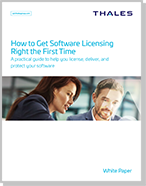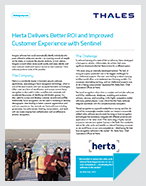Software License Server
Centralize software license management and achieve greater license compliance
All software and programs come with proprietary licenses that lay out the legal rights between the user and the publisher of the software. These rights include how many times a program can be used, where it must be used, and if it can be copied or modified.
For any company or organization, keeping track of multiple licenses can be challenging, and if it’s not done properly, it is all too easy to lose track of the number of users who can or should be using a particular piece of software. That might not seem like a big deal, but violating license agreements can carry criminal charges that could harm a company and its reputation - not to mention impact the bottom line for the publisher or vendor.
One way to make sure this scenario never happens is with a license server system, such as Sentinel RMS network licensing. With the RMS license configuration options, businesses and organizations can reduce their cost of software deployment and management, making it a must-have.
The most basic way to understand a software license server is that it is a way for companies to manage their software licenses and to ensure they only use the software or programs they are entitled to use.
To keep track of the licenses and users, the license server uses a centralized computer software system that gives access tokens - also known as software license keys - that allow licensed software to run on a client’s computer. No token - no access.
A license server system, such as the Sentinel RMS License Manager, acts as a digital gatekeeper. It does this by keeping a close watch on all of the “requests” to use a program or software and ensures that the number of workstations using an application or program matches the number of licenses or license entitlements for which the company is eligible. Once the number of users exceeds the number of purchased licenses, the license server will no longer give any new users access to the software.
A license manager tends to be used in conjunction with floating licenses and is essentially a floating license server. Using this type of license server system can result in huge savings for companies - savings that are more than offset by the initial license server price. This is because companies or organizations need not purchase a license for every single one of their workers. Instead, users take turns accessing the software.
To access a program or application, they must request a license from the license server. If there is a spare license available (i.e. if the number of users does not exceed the number of licenses) the license server allows the software to run.
Once the user no longer needs the program - or once the authorized license period has ended - the license server takes the license back and makes it available for other authorized users. This happens in much the same way as a library - there are only a few copies of each book available, so anyone who wants to take out a book must wait for another user to return their copy.
The licenses “live” in a license file on the license server and the license manager usually runs on a computer in the same network that a company or business has installed the licensed application.
When it’s started, the license manager reads the licenses from a file and creates a license table. Users can program the application to look for a license server with available licenses.
Once the licensed application is running, the user automatically sends a request to the license manager to obtain authorization. The license manager processes the request - including authenticating the clients, if necessary - and returns the status to the client.
The license manager maintains each request separately, treating these authorizations as separate clients.
As mentioned above, a key benefit of using a license server system is that it gives increased flexibility over how the software, applications, or programs can be used - making it possible for multiple and remote workers to easily use it.
This is the opposite of single installation software that has to be tied to a particular workstation. In such instances, there are workarounds (i.e. a VPN), but there is no way of transferring the license from one computer to another. That is not the case with a floating license server.
As long as there is an effective license server in place and a company has purchased the correct license entitlements, software can be shared between multiple workstations and multiple users with very little restriction.
That doesn’t mean that it’s a software free-for-all. There are limits with license entitlements specifying which machines and/or users the licenses are assigned and how many can be used at any one time. This is especially important for large or spread out workplaces. And, with increasing numbers of employees working remotely, this agility is likely to become even more important in the future.
The floating license server is also a boon for companies looking to rid themselves of the minutiae associated with installing, uninstalling, or transferring programs and software. All of these logistics are taken care of automatically, which allows IT departments to focus on other tasks or company goals.
Since the license manager tracks how many and even how the licenses are being used, companies are able to pull out data that will allow them to budget and even forecast future software purchases, making a license server so much more than just a license gatekeeper.

How to Get Software Licensing Right The First TimeCheck out our practical guide to navigating the process of licensing, delivering, and protecting your software. Discover the importance of optimizing your software licensing. Avoid common mistakes with the expertise you...

Simplify Internal Licensing Processes While Embracing Flexible Licensing - HERTA Case StudyHERTA Security Imagine a software technology that could automatically identify individuals that pose a threat to safety and security – by scanning crowds of people on the streets,...